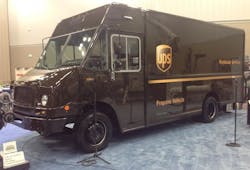That trucking is greening ever faster was exceedingly evident to me while in Indy attending numerous news conferences and taking in a dizzying array of booth displays promoting the environmental bona fides of all sorts of truck equipment at the annual NTEA Work Truck Show.
In making the rounds at that sprawling event, what came across as clearly as a brilliant blue sky is just what a Herculean task it must be for fleet owners to determine exactly which green powertrain solutions and equipment options will best fit truck duty cycles and applications to both cut operating costs and trim carbon foot prints.
Speakers at the Green Truck Summit that accompanied the show delved into the nitty-gritty aspects of specific alternatives to running on diesel or gasoline, but nothing said there left me thinking any more than I had before that trucking will ever settle on one fuel to drive it all.
What I heard about this alternative fuel vs. that alternative fuel brought to mind the wordless comic strip “Spy vs. Spy” (which Mad magazine began running in 1961) that illustrates the antics of two spies who are identical-- except one is dressed in black and the other in white— and locked in ceaseless seesaw combat.Much like the comic battles waged in Spy vs. Spy, it's a safe bet that trucking's Green vs. Green storyline will never yield a clear winner...
Of course, there are already several more than two players in the alt-fuel game (Biodiesel, Ethanol, CNG, LNG, LPG, Hydraulic Hybrid, Hybrid Electric, All Electric) with others expected to join in the pitch for fleet loyalties in the near (such as DME) and the longer term (such as Hydrogen).
Summit speaker Doyle Sumrall, NTEA managing director, perhaps said it best. “Fleet approaches to selecting alternative fuels remain eclectic,” he remarked. “Natural gas remains strong, but so do others.”
The point is the choices by which a fleet can be fueled to be green and save green are growing. And not even the proponents of any given alternative fuel suggest that their pony alone will win all the stakes.
While natural gas (in both its CNG and LNG forms) will arguably remain king of trucking’s green hill for some time to come, that other gaseous fuel propane autogas (LPG for short) made an awfully big splash at the show with the announcement by UPS that it plans to invest some $70 million to bring propane power into its U.S. fleet.
That investment will cover the purchase of 1,000 of its iconic “package car” medium-duty delivery trucks powered by propane autogas and the installation of an initial 50 LPG fueling stations at UPS-owned sites here.
Per UPS, the move “benefits from propane autogas’ wide availability as a result of increased natural gas production in the U.S. (LPG is a byproduct of natural gas), and there is more price stability with the accessible supply.”
Prototype UPS package car fueled by propane autogas on display at NTEA Work Truck Show, which was held March 4-7 in Indianapolis
Michael G. Britt, Sr., UPS’ director of Maintenance & Engineering International Operations, said the LPG-fueled step vans, to be built by Freightliner Custom Chassis Corp. (FCCC) will replace older gasoline- and diesel-powered units used largely in rural parts of Louisiana and Oklahoma. He added that propane use in other states is pending.
Later on, I asked Bryan Henke, FCCC’s manager—product marketing, for an OEM’s perspective on how the burgeoning market for alternatively fueled trucks may shake out.
Noting that FCCC currently builds trucks powered by diesel, gasoline, CNG and LNG and has prior experience with hybrid-electric powertrains, Henke said the company prides itself on “being a single-source [vehicle] provider based on the fleet’s fuel of choice.
“All fleets want to save money,” he continued. “But the [green] decision has to take in infrastructure, maintenance etc. You are not buying just the fuel. It all comes down to evaluating which power choice will best fit a fleet’s specific needs.”
Perhaps then, when it comes to green vs. green, there will be no winner— but also no losers.


